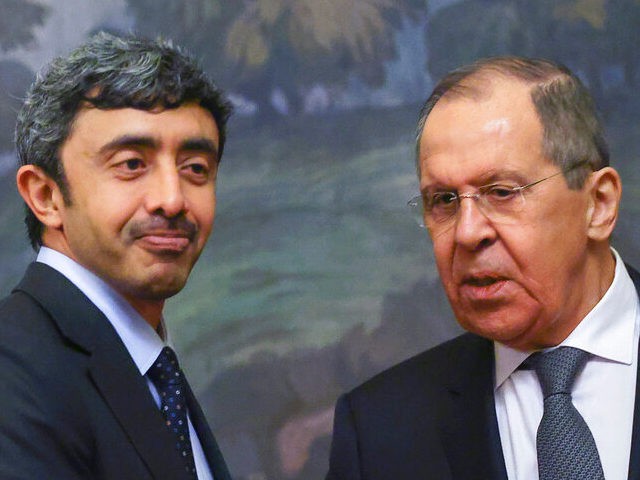United Arab Emirates (UAE) Foreign Minister Sheikh Abdullah bin Zayed al Nahyan said during a visit to Moscow on Thursday that his government looks forward to working with Russia – an outlaw state in the eyes of the U.S. and Europe – on “improving global energy security.”
“It is important to maintain the stability of energy and food markets,” Sheikh Abdullah said.
“Securing the global food supply is considered necessary as there are a lot of countries in the world either in our region or abroad that largely depend on the import or export of grain and other basic food supplies around the world,” he elaborated.
“We welcome all mediation efforts in the Ukraine crisis,” he stated. “The UAE is ready to engage with the parties to strengthen opportunities for a peaceful resolution.”
“We look forward to developing relations between the UAE and Russia and diversifying the areas of interdependence between our citizens, institutions and our governments,” he said.
Appearing at a press conference with Sheikh Abdullah after the two had a meeting in Moscow, Russian Foreign Minister Sergey Lavrov thanked the UAE for its “balanced stance on the Ukraine crisis.”
Reuters noted the UAE had made some tangible efforts to support Russia, which is a member of the “OPEC+” alliance of oil-producing nations. Along with fellow OPEC heavyweight Saudi Arabia, the UAE refused pleas from the Biden administration to increase production and push oil prices down, citing production limits set by OPEC+.
The UAE also abstained from the U.N. Security Council vote to condemn Russia’s invasion of Ukraine, which passed overwhelmingly despite 35 abstentions and five votes against it. The resolution was then vetoed by the president of the Security Council, which is currently Russia.
Sheikh Abdullah had a phone call with U.S. Secretary of State Antony Blinken last Tuesday, with the war in Ukraine as one of the major topics. If Blinken tried to get the UAE to distance itself from Russia or denounce the invasion, he was evidently unsuccessful.
The New York Times last week reported on fears among Western policymakers that the UAE could help Russian oligarchs evade punitive sanctions. Dozens of members of Russian leader Vladimir Putin’s inner circle own luxury properties in Dubai, collectively valued at over $314 million – and at least six of those Russian billionaires are already under U.S. or European Union sanctions.
“The Emirati stance is exposing tensions between the United States and several of its closest Arab allies over their reluctance to oppose the Russian invasion,” the Times noted.
“Asked for solidarity in a moment of crisis, the United Arab Emirates, Saudi Arabia and Egypt have instead prioritized relations with Moscow – the Emirates and Saudi Arabia by rebuffing American pleas for increased oil supplies to soothe energy markets, Egypt by muffling criticism of the invasion while proceeding with a $25 billion loan from Russia to finance a nuclear power plant,” the report said.
Al Jazeera News speculated on Monday the Biden White House will give the Emiratis considerable leeway to skirt Russia sanctions because it desperately needs Emirati help with keeping oil prices under control. The question will be if the White House’s focus on the Russian invasion comes to outweigh all other concerns.
A possible sign the West might be ready to start playing harder ball with the Emiratis was the decision by the Financial Action Task Force (FATF), an anti-money-laundering organization founded by the Group of Seven (G7) nations, to add the UAE to its global watch “gray list” in early March. The move essentially threatens the UAE with closer supervision unless its government does more to crack down on money laundering and terrorism financing. If the FATF is not satisfied with the UAE’s progress, it could be bumped to the far more restrictive “black list.”
Gray listing is no small matter, as Al Jazeera noted when the FATF announced its decision: it could put the UAE at a competitive disadvantage against Saudi Arabia, add significant compliance costs to doing business with UAE entities, and inflict what the International Monetary Fund (IMF) characterizes as “a large and statistically significant reduction in capital inflows.”

COMMENTS
Please let us know if you're having issues with commenting.